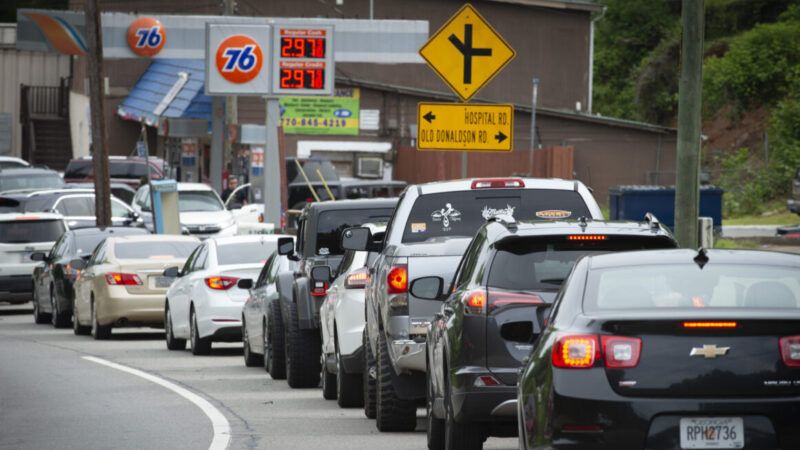The Colonial Gas Shortage Is Temporary, Bad Energy Policy Is Not
Making it easier to add energy capacity won’t prevent hacking hiccups, but it would help keep energy flowing.

When I wake up in the morning and check the news, I often feel like I am stuck in some kind of novel. Some days it feels like a madcap satire by Tom Wolfe. Other days the news reads like a second-rate imitation of George Orwell. This week, however, the news has had a decidedly cyberpunk feel to it: Hackers seized control of a major pipeline in the southeastern United States, cutting off supply, and motorists in some parts of the Southeastern U.S. are seeing gas stations run dry.
I know what it feels like to not be able to find gasoline anywhere. After Hurricane Harvey hit Texas and Louisiana, a number of refineries were temporarily out of operation, and people started to worry that these disruptions would result in gas shortages. As it turned out, this wasn't exactly true; gas supply remained mostly constant. But the worries about the potential for a disruption created a sort of self-fulfilling prophecy. Everyone rushed out to fill their tanks ahead of the shortage, and soon all the stations near where I lived in central Texas were out of gas. Fortunately, the whole situation resolved itself after a few days and everything went back to normal.
Something similar is happening now with the gas shortages in the Carolinas and surrounding states. While the Colonial Pipeline is important, existing gasoline stocks in most places should be sufficient to cover a week or two's worth of demand, by which point the pipeline should be operational again. The current shortages at stations are therefore likely the result of the same phenomenon that left me anxiously looking at my gas gauge back in 2017.
These sorts of disruptions are annoying, but they don't signal an imminent Mad Max-style future for America. They are, by nature, self-limiting. People aren't using more gas overall, merely moving up the timing of their purchases. In fact, the amazing thing is how well supply chains have generally adapted to the changes and strains of the last year. Reading stories about how 12 percent of global shipping was blocked because a single cargo ship got stuck in the Suez Canal could easily leave one with the impression that our system was very fragile. But the truth is if you didn't read the news you wouldn't have noticed any effect on your daily life (unless you work in shipping, of course).
By contrast, government regulatory restrictions can create shortages that last much longer and are harder to work around. Gas lines like we are seeing in North Carolina today were a common feature of life throughout America during parts of the 1970s. That was not due to hackers or hurricanes but rather bad government policy. Unlike businesses, which have a direct financial incentive to adapt to changed circumstances, government bureaucracy is not exactly known for being quick to update.
Similarly, government restrictions on energy infrastructure such as pipelines not only can make us more vulnerable to attacks on existing infrastructure, but could lead to ongoing shortages of fuel supply. New England, for example, faces recurring issues with its natural gas supply due to a reluctance of those states to approve pipeline development. Elsewhere in the country, projects such as the Keystone or Dakota Access pipelines have turned into interminable political controversies that take many years, if not decades, to resolve.
This isn't just true of pipelines. A whole host of energy projects, increasingly including clean energy projects, are getting bogged down in permitting delays. Environmental reviews under the National Environmental Policy Act (NEPA) was originally expected to only take a year to complete, with the resulting environmental impact statements to be no more than 150 pages. Today the average impact statement is over 600 pages and takes five years to prepare.
It would be going too far to say that NEPA reform or faster state permitting would have prevented the current situation with the Colonial Pipeline. There will always be systemic risks that can't be solved by just building spare capacity. But it does help to highlight an issue that has been simmering for years, but has not received the attention it deserves. The Colonial Pipeline hiccup has reminded us just how important our often-invisible infrastructure is to our daily lives. Even as infrastructure is ostensibly a big priority both for the Biden administration and the Republican opposition, the prospects for a meaningful updating of NEPA remains far from clear. Reforming NEPA and speeding up pipeline approval are never going to be headline-making issues to the degree that a cyber-attack on pipelines certainly is. But they could prove just as important to people's lives.


Show Comments (71)